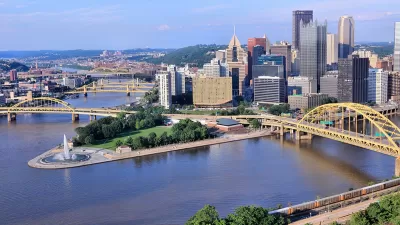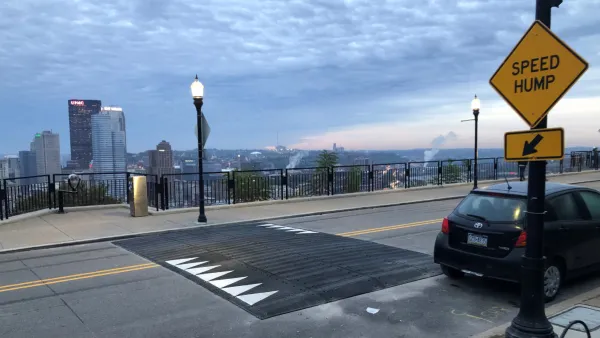The state of Pennsylvania has released Pittsburgh from the terms of Act 47, signaling a new era of fiscal security for the city, and a sign of home for the "Rust Belt."

"Fourteen years after entering a state program to restore its finances, the City of Pittsburgh has emerged from distressed status," reports Adam Smeltz.
State and local leaders gathered on Monday to formalize the city’s exit from Act 47, "which guided Pittsburgh back from the brink of bankruptcy." In effect, Act 47 "limited the city hall’s direct control over its budgets, establishing a recovery plan that cut costs, reduced the municipal workforce and managed long-term obligations such as debt and pension expenses. City finances have since swung from projected deficits to steady surpluses."
After demonstrating a stable fiscal situation over several years, the city has also put into place financial best practices to ensure fiscal health in the future.
This fiscal success if set against the ongoing redevelopment and revitalization of the city's urban core. Pittsburgh is frequently cited as an example of successful revitalization in Rust Belt cities, and Pittsburgh provides the Planetizen news feed a steady source of stories about large development investments:
- Almost a Billion Dollars of Redevelopment Investment Headed to Pittsburgh's South Shore (January 2018)
- Ferris Wheel Proposed With Big Mixed-Use Plans Near Downtown Pittsburgh (December 2017)
- Cap Park Plans Take Shape in Downtown Pittsburgh (December 2017)
- The Young History of Open Data Leadership in Pittsburgh (November 2017)
-
Three New Hospitals Slated for Pittsburgh (November 2017)
FULL STORY: 'Pittsburgh is back': City officially drops its financially distressed status

Planetizen Federal Action Tracker
A weekly monitor of how Trump’s orders and actions are impacting planners and planning in America.

Map: Where Senate Republicans Want to Sell Your Public Lands
For public land advocates, the Senate Republicans’ proposal to sell millions of acres of public land in the West is “the biggest fight of their careers.”

Restaurant Patios Were a Pandemic Win — Why Were They so Hard to Keep?
Social distancing requirements and changes in travel patterns prompted cities to pilot new uses for street and sidewalk space. Then it got complicated.

California Homeless Arrests, Citations Spike After Ruling
An investigation reveals that anti-homeless actions increased up to 500% after Grants Pass v. Johnson — even in cities claiming no policy change.

Albuquerque Route 66 Motels Become Affordable Housing
A $4 million city fund is incentivizing developers to breathe new life into derelict midcentury motels.

DC Area County Eliminates Bus Fares
Montgomery County joins a growing trend of making transit free.
Urban Design for Planners 1: Software Tools
This six-course series explores essential urban design concepts using open source software and equips planners with the tools they need to participate fully in the urban design process.
Planning for Universal Design
Learn the tools for implementing Universal Design in planning regulations.
Heyer Gruel & Associates PA
JM Goldson LLC
Custer County Colorado
City of Camden Redevelopment Agency
City of Astoria
Transportation Research & Education Center (TREC) at Portland State University
Camden Redevelopment Agency
City of Claremont
Municipality of Princeton (NJ)





























